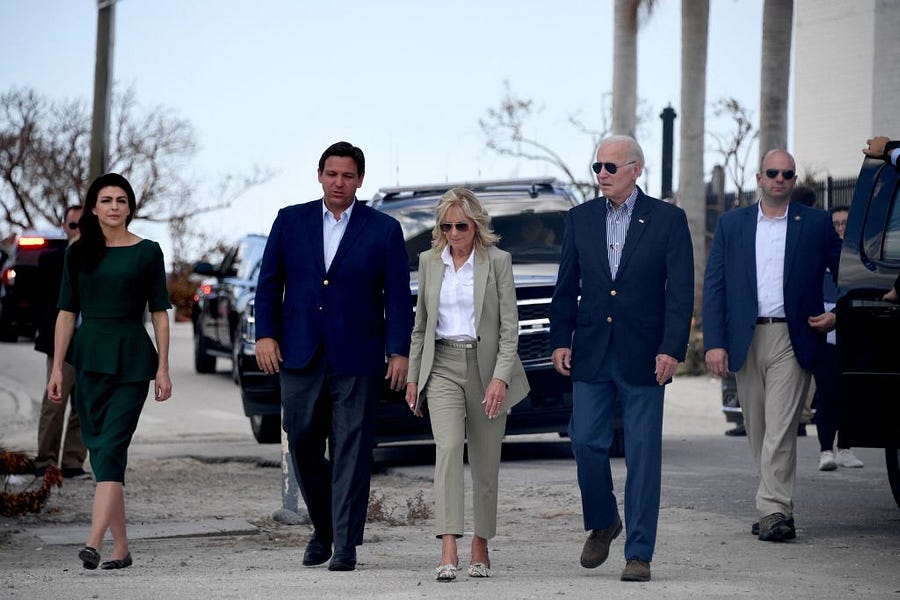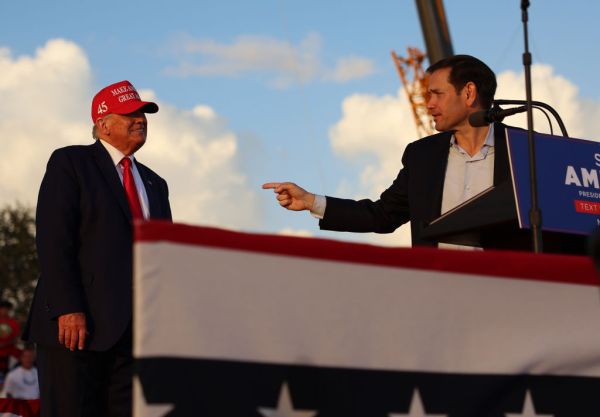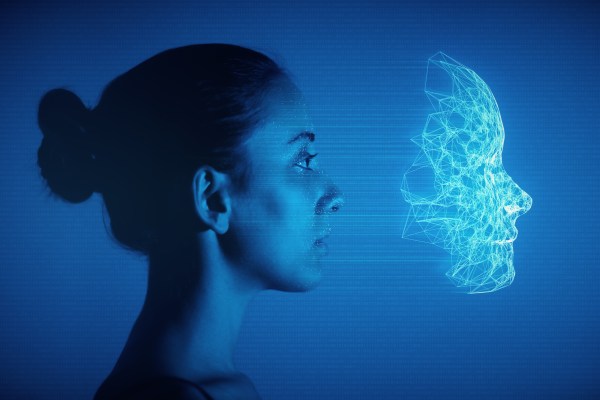It’s strange yet true that two different Republican governors, each with national aspirations, ruined their careers by hugging a Democratic president.
Even stranger, neither one actually hugged him.
Stranger still, a third Republican governor may have just cemented his viability as a presidential contender by … hugging a Democratic president.
Except they didn’t really hug either.
Politics is confusing in the Trump era, but we can’t blame that since the two career-ruining hugs happened years before Donald Trump became a candidate. Even if, in hindsight, the right’s reaction in both cases presaged the bitter partisan antagonism that made the party ripe for a Trumpist takeover later.
If not Trump, what explains the difference? Why were Charlie Crist and Chris Christie haunted ever after by their gladhanding of Barack Obama while Ron DeSantis has received a pass, if not outright applause, from conservatives this week for having cordially welcomed Joe Biden to Florida?
Context is everything. For our purposes, it boils down to timing and credibility.
The Obama hugs were badly timed, in starkly different ways.
Crist’s meeting with Obama came a few weeks into the new president’s first term. Republicans were still smarting from their destruction at the polls the previous November. Democrats had won total control of government and Obama had amassed the most votes of any presidential candidate in U.S. history to that point. The media chirped excitedly about him becoming a new FDR who would use his congressional majorities to spend America out of the Great Recession. A new age of left-wing dominance was, allegedly, upon us.
The conservative backlash had already begun to brew. Nine days after Crist’s event with Obama in Fort Myers, Florida, Rick Santelli would deliver his famous rant on CNBC about government bailouts that’s since become known as the unofficial start of the Tea Party movement.
It was in that environment that Crist, a Republican (at the time) governor, welcomed the new FDR to his home state to tout Democrats’ massive new stimulus package. Their greeting was less a hug than something we might call “huggish,” a handshake and back-slap sans embrace. But the damage was done. Marco Rubio would use that moment to expert effect in Florida’s Republican Senate primary later that year, turning newly minted Tea Partiers against Crist. “[T]hat simple gesture ended my career as a viable Republican politician,” Crist would later write.
Chris Christie’s “hug” was timed even more poorly. Obama arrived in his home state of New Jersey days before the 2012 election to survey the damage from Hurricane Sandy and promise the federal government’s help. Partisanship always peaks shortly before a major election, making the moment politically fraught for Christie no matter how carefully he handled it. But he wasn’t careful. Again, there was no “hug”—there was a handshake and some more back-slapping (arm-slapping, really)—but there was a rhetorical embrace if not a physical one. Christie showered praise on Obama, calling him “outstanding,” “incredibly supportive,” and worthy of “great credit” for his help with the recovery effort. He even took a ride over Jersey with the president in Marine One.
When Obama cruised to reelection a week later, furious conservatives accused Christie of having influenced the outcome. They might have been right:
Inside the Romney campaign, there is little doubt that Mr. Christie’s expressions of admiration for the president, coupled with ubiquitous news coverage of the hurricane’s aftermath, raised Mr. Obama’s standing at a crucial moment.
During a lengthy autopsy of their campaign, Mr. Romney’s political advisers pored over data showing that an unusually large number of voters who remained undecided until the end of the campaign backed Mr. Obama. Many of them cited the storm as a major factor in their decision, according to a person involved in the discussion.
“Christie,” a Romney adviser said, “allowed Obama to be president, not a politician.”
Christie spent the next three years trying to explain away his ill-timed “hug.” He was attacked for it by rival candidates during the 2016 presidential primaries and ended up an afterthought in the campaign. His last meaningful act as a national figure was to endorse Donald Trump for president, making him the first establishment Republican of any notoriety to do so. Having relegated himself to a sort of fringe within the party by his behavior with Obama, he chose to depart the political stage by dragging Trump from his own fringe into the mainstream.
The two “hugs” turned out to be bookends to Obama’s first term, with each treated by conservatives as an act of sabotage because of their timing. Crist legitimized Obama and his big-government ways just as the grassroots right was organizing to thwart them; Christie legitimized Obama as a competent manager just as the party was mobilizing to try to turn him out of office.
The terrible timing may have made the episodes unsurvivable even if Crist and Christie had built sterling populist credentials to that point. But they hadn’t.
Crist was and is a consummate establishment politician. He spent 15 years in Florida politics before becoming governor. Once elected, he endorsed John McCain for president in 2008, tilting the crucial Florida primary that year to one of the activist right’s least favorite politicians. In 2010 he received the endorsement of the National Republican Senatorial Committee for Senate, raising an outcry among Tea Partiers who resented seeing an official party organ weigh in against Rubio’s upstart bid. When Rubio zoomed past Crist in the polls, Crist quit the GOP and declared himself an independent in hopes of winning the general election amid a three-way race.
He failed. By late 2012 he had declared himself a Democrat. By 2017 he was part of the Democratic caucus in the House, and he stands a very (very) slight chance of being the new Democratic governor of Florida next year. If you’re a populist who’s keen to prove that establishment politicians believe in nothing except clinging to power, Charlie Crist is your Exhibit A. He’s a careerist’s careerist, the opposite of a committed ideologue.
Although, having said that, I’m not so sure the populists who disdain Crist believe in anything except clinging to power either.
Christie’s relationship with the grassroots right began more auspiciously. He became a sensation in conservative media circa 2010 due to his knack for uncorking pugnacious soundbites about his archenemy, New Jersey’s teachers union. It’s no exaggeration to say that the familiar phenomenon of populist heroes like Ted Cruz and Ron DeSantis grandstanding combatively in front of cameras about the libs in hopes of going viral was pioneered by Christie more than a decade ago. By 2011, he had gained such a reputation as a “fighter” that figures like Ann Coulter were touting him as a dark-horse candidate for the GOP nomination.
But Christie always operated under a cloud of suspicion by dint of his cultural pedigree. He was a blue-state governor from the northeast, an uneasy fit for a Southern-based socially conservative party. And although he was “plain-spoken” and eager for rhetorical combat, he was never quite the loose-cannon disrupter that Trump was. He was a Bush guy, appointed a U.S. attorney by Dubya in 2002. He was a member of the Republican Party establishment, so much so that he would lead the Republican Governors Association in 2013. He’d spar with the teachers unions, sure, but he wouldn’t stand up and say anything really politically incorrect, like how we should ban Muslims around the world from entering the U.S. for a while. Trump overcame his regional mismatch with the base by standing entirely outside of conventional politics, allowing him to “speak” for them in ways that polished politicians couldn’t. (His national celebrity may have also unmoored him in the Republican imagination from his connections to the New York region to some degree.) Christie didn’t have that advantage.
So when he “hugged” Obama in 2012, his small reservoir of populist goodwill evaporated quickly. By the time he quit the primary in 2016, he was polling at 3 percent.
Neither he nor Crist read the proverbial room accurately, but they had misread it for different reasons. Crist, I suspect, simply didn’t foresee the populist turn the Republican base was about to take in 2009 or else he would have greeted Obama differently. The rapturous reception Sarah Palin received as McCain’s vice presidential nominee the year before turned out to be an early warning, but not enough of one. Christie, on the other hand, had not only detected the party’s populist turn by 2012, he had surfed it to national political stardom. My guess is that he thought he had accrued enough brownie points among grassroots Republicans by the time Hurricane Sandy arrived that he could get away with some bipartisan chumminess toward Obama.
Both of them miscalculated.
I don’t think Ron DeSantis has miscalculated by rhetorically “hugging” Joe Biden this week.
We shouldn’t overthink the political incentives here for DeSantis. By and large, he has no choice but to behave cordially toward Biden at the moment. To get up to “Let’s go, Brandon” antics of performative opposition while homes in Florida are still underwater would lead all but the grubbiest populists to wince.
After all, the most basic, basic, basic duty of a governor of the state of Florida is to competently manage the aftermath of hurricanes. DeSantis understands that. So does his social media team.
Cooperating with the federal government to assure an efficient recovery is part of that duty. If DeSantis went out of his way to alienate Biden in order to impress the base with his eagerness to “fight,” he’d be seen as jeopardizing the recovery effort. And then he might find himself in real political trouble.
So, granted, playing nice with Biden for a few weeks is in one respect simple good sense. But the timing plus DeSantis’ own populist credibility make it a shrewd move politically, even so.
Superficially Biden’s visit looks a lot like Obama’s visit to Christie in 2012, a Democratic president swooping in with hurricane relief for a Republican governor shortly before an election. But in 2012, it was Obama who was on the ballot; in 2022, it’s DeSantis. Conservatives resented Christie because his photo op with the president reeked of him doing Obama a favor. This time, if anything, it’s Biden who’s doing DeSantis a favor by giving him a shot of bipartisan credibility shortly before Floridians go to vote.
Imagine the look on Charlie Crist’s face when he saw this.
“I think he’s done a good job,” Biden said of DeSantis elsewhere, emphasizing how the state and the federal government have worked “hand in glove” on recovery from the storm. We shouldn’t overthink that either: Obviously, Biden also has an electoral incentive to make sure voters know that the Democratic-led federal government is responding effectively to a major disaster.
But praise for DeSantis from the leader of the Democratic Party is a potential dagger for Crist in the gubernatorial race since it limits his ability to make the case that DeSantis’ management has been poor. “A literal hug from a Dem president in Fort Myers killed Crist’s career as a Republican; a figurative one for his opponent 13 years later is a poetic nail in the coffin for his future as a Dem,” an astonished Liam Donovan tweeted yesterday.
In time it may be seen as a nail in the coffin for Trump’s career too. The only way Trump isn’t the Republican nominee in 2024 is if Ron DeSantis defeats him, and the only way Ron DeSantis defeats him is by persuading primary voters that he’s indisputably more electable than Trump. Margins will matter—a lot—in this fall’s gubernatorial race to DeSantis’ ability to make that case convincingly. A 3-point win over Crist would be no more impressive than Trump’s own 3-point victory over Biden in Florida in 2020. A 10-point win would be something else.
If you believe the latest polling, a 10-point victory isn’t out of the question, particularly given DeSantis’ massive advantages in fundraising and ad spending. At a moment when he gets to stand above the fray of normal partisan politics and play rescuer-in-chief for his battered state, it seems increasingly plausible. Having Joe Biden stand next to him, vouching for his competence to center-left undecideds who broke against Trump two years ago, makes it more plausible still.
Given the stakes not just for his viability against Crist in 2022 but against Trump in 2024, then, saying a few flattering words about the federal response to earn the president’s quasi-endorsement is a sound political investment by DeSantis.
Why, he even got to stand behind the presidential seal. I wonder how that spectacle was received at Mar-a-Lago.
Still, despite the favorable timing of Biden’s praise for him, one could imagine how this might have backfired on DeSantis in a future presidential primary if he were a different sort of Republican. Imagine Maryland Gov. Larry Hogan, say, being lavished with compliments by a Democratic president for his management of a natural disaster. “Of course Biden would say that,” a populist might think. “Hogan’s basically a Democrat. This only confirms it.”
That’s how Crist and Christie got into trouble with the Republican base. They didn’t have enough grassroots credibility banked to weather a kumbaya moment with a hated liberal.
DeSantis has more than enough credibility and continues to nimbly pick his spots to amass more. For instance, here he is between photo ops with Biden this week seizing an opportunity to air his grievances about the national media to a guy wearing a “Three Percenter” shirt.
The governor isn’t culturally or politically suspicious to conservatives the way Crist and Christie were. The last time he and his team made news before the hurricane, you may recall, was for tricking a group of asylum-seekers in Texas into getting on a plane to Martha’s Vineyard, an own-the-libs and own-the-migrants twofer to populists. He’s allegedly been heard to profess his jealousy of Texas’ border crisis, fantasizing cynically about how a right-wing populist might exploit a problem like that. He’s been so thirsty to stockpile “Let’s go, Brandon” chits with the base that he once signed a bill barring companies from imposing vaccine mandates in the town of Brandon, Florida.
Frankly, I wonder if his eagerness to lash Biden for political benefit wasn’t part of the White House’s political calculation in responding to the hurricane. Any hiccup in the overall government response would have been blamed aggressively by DeSantis’ office on the feds, probably replete with dark accusations about the Brandon administration targeting Floridians for their rightward drift electorally. Playing nice allowed both sides, not just DeSantis, to avoid a major headache with unpredictable consequences for the midterms.
Between the timing here and his populist credibility, conservatives have had good reasons to cut DeSantis slack on “hugging” Biden, then. But there’s another reason to do so.
DeSantis isn’t just selling himself to Republican primary voters as “Trump, but electable.” He’s selling himself as “Trump, but competent.”
Diehard Trump fans, the 30 percent of the party that’ll vote for him no matter what, would never doubt Trump’s competence. But the rest of the GOP would surely relish a nominee next time who’s knowledgeable about policy and experienced at crisis management. If you believe Vanity Fair, DeSantis will make competence a core part of his argument against Trump if he runs in 2024:
DeSantis in private trashes Trump. “He calls him a TV personality and a moron who has no business running for president,” a former DeSantis staffer said. DeSantis tells donors that, if he takes on Trump, he would launch a full frontal attack on his record and competence, according to a GOP source briefed on the conversations. “DeSantis says the only way to beat Trump is to attack him head-on. He says he would turn to Trump during a debate and say, ‘Why didn’t you fire Fauci? You said you would build the wall, but there is no wall. Why is that?’”
I’m skeptical that he’ll be that confrontational unless and until he absolutely has to be. There’s no point to winning the nomination if it means alienating the diehard MAGA 30 percent by calling their hero a loser. DeSantis would need them to turn out in the general election and they might not.
But he can go positive on competence before he goes negative. That starts with reminding Republican voters how he kept Florida’s public schools open in the fall of 2020 as students elsewhere across the country began to fall behind. And it now extends to reminding them that he did such a good job managing Florida’s recovery from Hurricane Ian that even Joe Biden felt obliged to praise him for it.
Most Republican voters don’t want a president who’ll punish a state by withholding aid if its governor happens to criticize him—I hope. Most don’t want to watch COVID briefings turn into hourlong stemwinders about the president’s grievances with the media. Watching DeSantis suppress his instinct for bareknuckle political combat and shift to cooperating with the White House is a neon sign showing Republican voters that, unlike certain people who shall remain nameless, he has more than one mode. He can rein it in when it’s in the public interest to do so.
If you’re keen to see Trump replaced as leader of the party by someone like that, and all people with a shred of civic conscience are, then you have every incentive to give DeSantis a wiiiiiide berth in how he handles the Ian aftermath. Think of it as a “market correction.” If populists were being under-served by the Republican leaders of 2009 and 2012, they’ve since been over-served by Trump and Trumpism. Letting a governor slide on “hugging” a Democrat after a hurricane is a baby step back toward a more efficient, and normal, political market.
Essentially, DeSantis is gambling that even populists have quietly tired of Trump’s pettiness and incompetence and will reward an alternative who “fights” with one hand and steers the ship reliably with the other. There certainly are contingents within the party that are tired of that—Never Trumpers, of course, as well as the so-called “anti-anti-Trumpers” who populate establishment conservative media—but is there a majority?
I’m not so sure.









Please note that we at The Dispatch hold ourselves, our work, and our commenters to a higher standard than other places on the internet. We welcome comments that foster genuine debate or discussion—including comments critical of us or our work—but responses that include ad hominem attacks on fellow Dispatch members or are intended to stoke fear and anger may be moderated.